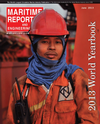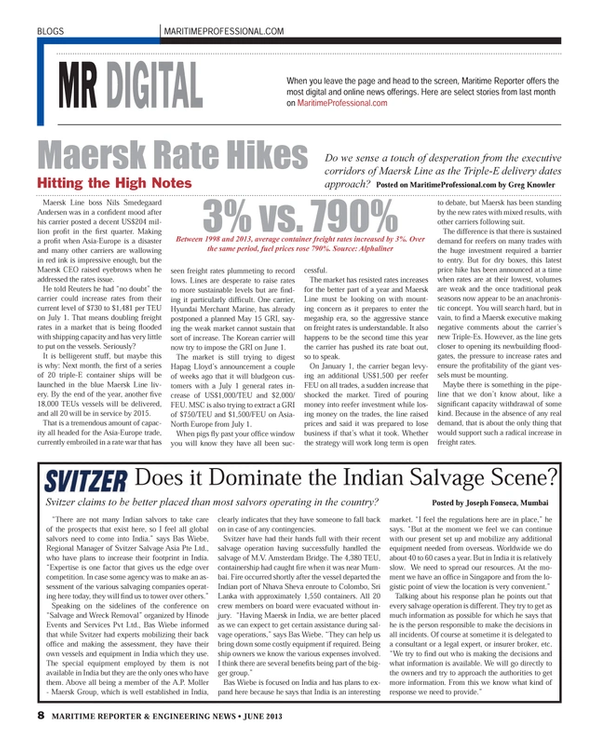
Does Svitzer Dominate the Indian Salvage Scene?
Svitzer claims to be better placed than most salvors operating in the country?
“There are not many Indian salvors to take care of the prospects that exist here, so I feel all global salvors need to come into India.” said Bas Wiebe, Regional Manager of Svitzer Salvage Asia Pte Ltd., who have plans to increase their footprint in India. “Expertise is one factor that gives us the edge over competition. In case some agency was to make an assessment of the various salvaging companies operating here today, they will find us to tower over others.”
Speaking on the sidelines of the conference on “Salvage and Wreck Removal” organized by Hinode Events and Services Pvt Ltd., Bas Wiebe informed that while Svitzer had experts mobilizing their back office and making the assessment, they have their own vessels and equipment in India which they use. The special equipment employed by them is not available in India but they are the only ones who have them. Above all being a member of the A.P. Moller - Maersk Group, which is well established in India, clearly indicates that they have someone to fall back on in case of any contingencies.
Svitzer have had their hands full with their recent salvage operation having successfully handled the salvage of M.V. Amsterdam Bridge. The 4,380 TEU, containership had caught fire when it was near Mumbai. Fire occurred shortly after the vessel departed the Indian port of Nhava Sheva enroute to Colombo, Sri Lanka with approximately 1,550 containers. All 20 crew members on board were evacuated without injury. “Having Maersk in India, we are better placed as we can expect to get certain assistance during salvage operations,” says Bas Wiebe. “They can help us bring down some costly equipment if required. Being ship owners we know the various expenses involved. I think there are several benefits being part of the bigger group.”
Bas Wiebe is focused on India and has plans to expand here because he says that India is an interesting market. “I feel the regulations here are in place,” he says. “But at the moment we feel we can continue with our present set up and mobilize any additional equipment needed from overseas. Worldwide we do about 40 to 60 cases a year. But in India it is relatively slow. We need to spread our resources. At the moment we have an office in Singapore and from the logistic point of view the location is very convenient.”
Talking about his response plan he points out that every salvage operation is different. They try to get as much information as possible for which he says that he is the person responsible to make the decisions in all incidents. Of course at sometime it is delegated to a consultant or a legal expert, or insurer broker, etc. “We try to find out who is making the decisions and what information is available. We will go directly to the owners and try to approach the authorities to get more information. From this we know what kind of response we need to provide.”
(As published in the June 2013 edition of Maritime Reporter & Engineering News - www.marinelink.com)
Read Does Svitzer Dominate the Indian Salvage Scene? in Pdf, Flash or Html5 edition of June 2013 Maritime Reporter
Other stories from June 2013 issue
Content
- “Lies, Damned Lies & Statistics” page: 6
- Maersk Rate Hikes Hitting the High Notes page: 8
- Does Svitzer Dominate the Indian Salvage Scene? page: 8
- What You Need to Know to Operate Offshore Brazil page: 10
- Why TWIC? page: 14
- Cargo Morphs in New Directions page: 16
- Annual Economic Sanctions Update page: 18
- Infrastructure for Alaska’s LNG and Other Resources page: 22
- Non-Tankers Next on OPA 90 List page: 26
- Sail Safe BC Ferries’ Safety Initiative page: 30
- Simulation Trends of Tomorrow page: 32
- Economic Impacts of STCW 2010 page: 34
- Breaking Down The Cost of MARPOL page: 36
- The Year in Review page: 40
- Dr. Shashi Kumar page: 44
- Boxed In page: 46
- Contamination Controlled page: 48
- If in Doubt, Ask the Doctor: Is it Time to Buy? page: 52
- Finnish Shipbuilding and Arctic Operations page: 54
- Irving Plans for the Future page: 55
- German Shipbuilding Prospects are Fair & Partly Cloudy page: 58
- Hull Medic: Keep Coats Efficient page: 72
- Diesel-Electric Units Prepared for Navy’s AGOR Project page: 73
- Integrated Bridge Shaping the Future page: 74


